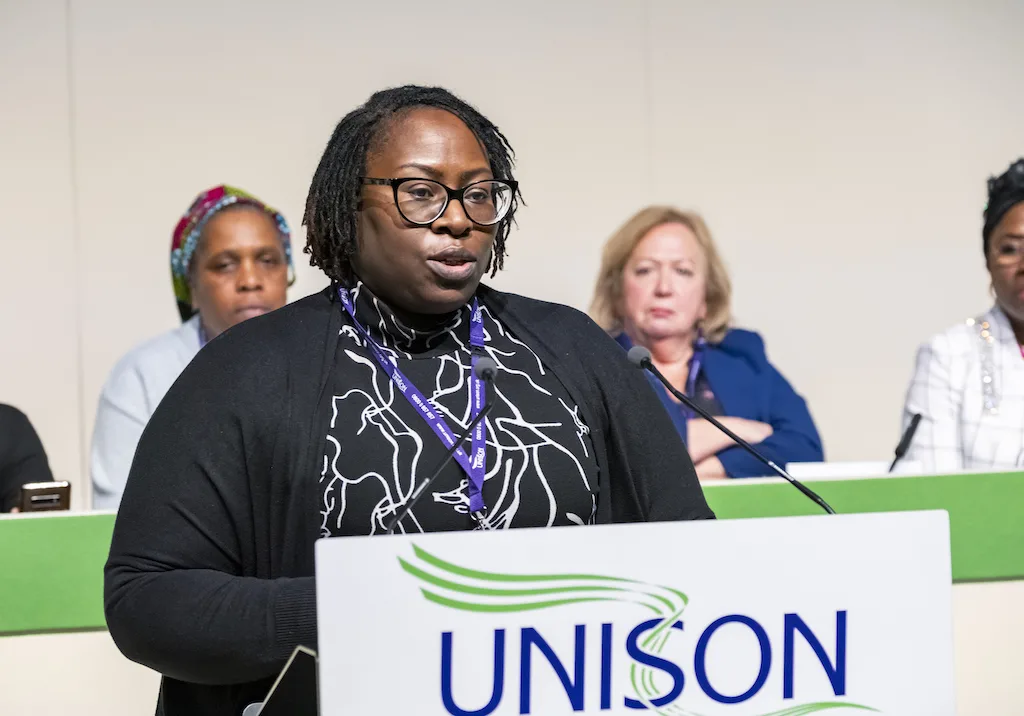Fummi Ayani. Image: Rod Lyon
Mental health, especially for young people, was one of the major themes of this year’s national Black members’ conference, in Brighton at the weekend.
The motion on young Black members and mental health, proposed by the national committee, noted that, according to the NHS, more than three million people had contact with mental health services during 2021/22, almost 6% of the population.
The Mental Health Foundation says that 50% of mental health problems are established by age 14, 75% by age 24. And yet, many young people do not receive appropriate interventions.
Further, the motion stated, it is commonly known that those in Black communities are more likely to experience mental health difficulties, due to racism and discrimination, social and economic inequalities, and difficulties accessing appropriate support and interventions.
Fummi Ayani, a delegate for the young members’ forum (above), told conference: “We have to be present, and know that it’s OK not to be OK. Being labelled as aggressive is not who I am. I am a young, Black, thriving woman. And my mental health matters, which UNISON have helped me to see.”
The conference agreed to:
- Signpost young Black workers towards available mental health services and other support
- Highlight constructive steps employers can take to support staff with mental health problems
- Campaign against the stigma surrounding mental health
- Support branches to review how many employers are monitoring the mental health of young Black workers in workplaces.
Ms Ayani’s comments chimed with another motion on the issue. ‘Destigmatising Black workers’ mental health illness’, from UNISON Northern Ireland, noted the barriers faced by Black people when accessing information and treatment for mental health care, and the fact that Black communities are more likely to experience stigma and shame due to negative stereotyping.
Mental health illness is often misunderstood and mislabelled as being aggressive in minorities. And the motion called for the national Black members’ committee to run media and social media campaigns that flag the issues members are facing at work, and campaign for change.
The committee will also develop a toolkit for activists and members to equip them with the understanding of the cultural barriers faced by Black workers, and work with Learning and Organising Services to develop packages to support the mental health and wellbeing of activists.

In 2002, a leaked NHS report noted that Black children and adults were continuing to be failed by mental health services, with higher rates of detention and lower access to support services.
Speaking on the motion, ‘Black children’s mental health’, Faith Jangara of the national Black members’ committee (above) said it was important “to ensure that understanding and appropriate support is offered to our Black children with mental health problems.
“Black children deserve to be seen and have understanding when it comes to their mental well-being.”
Conference called on the committee to:
- continue to promote awareness of mental health issues of Black communities in the workplace
- encourage branches to support services providers to create services for Black members experiencing this issue
- promote tolerance of Black mental health issues in the workplace amongst employees and the wider community.
Reflecting the mood in the hall, first-time delegate Salqa Naz, of Sheffield Community health branch, said: “ I am very passionate about my work, and want to help drive forward this campaign.”
This section is about equality for Black members. UNISON’s Black members group works with all parts of our union to improve equality in the workplace and challenge racism and discrimination.


